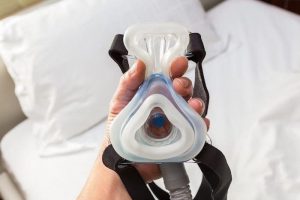
If you’ve recently been diagnosed with sleep apnea, you may be feeling overwhelmed and wondering how long does CPAP take to work. You’ve conquered the sleep study and gotten your equipment, but now you’re struggling to get comfortable while sleeping with your CPAP. For many, sleeping with a CPAP can take some adjustment. The good news is that there are many things you can do to improve your CPAP therapy experience.
Discovering how to navigate some common issues experienced by those new to CPAP can help you improve your sleep apnea symptoms and help you get better rest as soon as your first night with your CPAP.
How Long Does CPAP Take to Work?
The key to successful CPAP therapy is consistency and patience. If you are new to CPAP treatment, it may be difficult to tell if it’s working, leaving you to wonder how long does CPAP take to work. One sure sign that the treatment is working is that you are finding you sleep through the night more often. The amount of time it takes certainly varies: some experience improvements right away and others may not feel the effects for weeks or even months.
Another factor that impacts how long does it take for CPAP to work is what type of sleep apnea you have. Those with Obstructive Sleep Apnea (OSA) may feel some improvements after a single night. Someone being treated for other instances of sleep apnea, on the other hand—such as Central Sleep Apnea (CSA) or Complex Sleep Apnea (CompSA)—may require more time and patience to adjust.
It’s also not uncommon for the person who sleeps next to you to actually be the first one to feel the results from CPAP. They may notice that you are less likely to snore at night or suffer the paused breathing common with sleep apnea. As a result, your sleeping partner may find that their sleep and overall mood is greatly improved right from the start of your therapy. Additionally, studies show that CPAP adherence over time can also improve the quality of your relationship.
How Long Does it Take to Adjust to CPAP?
It depends, but there are several things you can do to get to a better night of rest sooner rather than later. The very first thing you can do to shorten the time it takes for CPAP to work is to use your machine every single night. If you are using your CPAP nightly on a regular basis and still experiencing problems, there are a few things to investigate:
- Your Mask Feels Uncomfortable: The first thing you can do is get used to your CPAP mask. Some experience some discomfort the first time they wear their mask. To get acclimated some people mask-train during the day (if possible) by wearing their mask around the house. This can work for some, but it’s limited to the type of mask someone has.
- Your Mask May Not Be the Right Fit: Another factor that can help make your CPAP therapy successful is ensuring you have the right mask for your sleep apnea type and personal sleeping style. CPAP masks come in various shapes and sizes, and sometimes the one that felt right at the doctor’s office may not be the best fit at home. Natural body changes over time can also cause you to require a different mask.
- Your CPAP is Set Up Incorrectly: When you completed your sleep study to determine your CPAP needs, the test measured the number of stop-start breathing episodes you had. Called apnea-hypopnea index (AHI), this index number helps doctors determine the level of severity of your apnea. To calculate this figure, doctors observe the number of these episodes during the sleep test and divide it by the number of hours slept. CPAP therapy aims to reduce your AHI to five episodes or less per hour. If after being on CPAP for a while you still don’t feel the benefits, check to see if your AHI is still five or higher. If so, you may need to either adjust your pressure settings or check your mask for leaks.
There are also a variety of other common problems that you may experience if your new to CPAP, but there are also other things you can try to get acclimated to CPAP.
How Long Do You Have to Use a CPAP Machine?
The million dollar question isn’t usually about how long you have to use your CPAP machine before you notice that it’s working, but rather how long it takes until you’re free of apnea symptoms. The answer, though, isn’t simple—the goal of CPAP therapy isn’t to make your apnea go away, but to help you manage the symptoms you experience.
While it’s possible for someone to be free of sleep apnea symptoms over time, it will take dedication to their CPAP therapy and changes to lifestyle choices (like consuming less alcohol and caffeine, smoking cessation, and getting regular exercise).
Another consideration for continued compliance are the general improvements that help stave off symptoms as daytime sluggishness and brain fog, depression, and sleeplessness. Despite these benefits, some still resist CPAP; a study showed that unpartnered women with OSA were less likely to be compliant with CPAP than those who had a partner.
Final Thoughts

It’s understandable that you want to know how long does CPAP take to work. Aside from meeting with your doctor to discuss why CPAP may not be working for you, there are also several resources available to you, including our blog and free digital forum. We also have customer service representatives available to answer questions as well as in-depth FAQs that may answer questions you may have to help you get the most out of your CPAP treatment.
You can also talk to your doctor if you are worried and wondering how long does CPAP take to work. Your doctor can provide insights and answers, as well as updates about your personal health. By working together, you can find the best approach to your symptoms and the best way to manage your health and your sleep.
References:
1. Nasal CPAP: MedlinePlus Medical Encyclopedia. (2011, July 31). MedlinePlus. https://cybercemetery.unt.edu/archive/oilspill/20120924203408/http://www.nlm.nih.gov/medlineplus/ency/article/001916.htm
2. Weaver, Terri E., et al. “Relationship Between Hours of CPAP Use and Achieving Normal Levels of Sleepiness and Daily Functioning”. Published in the medical journal Sleep, June 1, 2007. Accessed August 14, 2018.
3. Andreea Antonescu-Turcu, MD and Sairam Parthasarathy, MD. “CPAP and Bi-level PAP Therapy: New and Established Roles”. Published in the medical journal Respiratory Care, June 22, 2011. Accessed on August 14, 2018.
The post How Long Does CPAP Take to Work? appeared first on CPAP.com Blog.